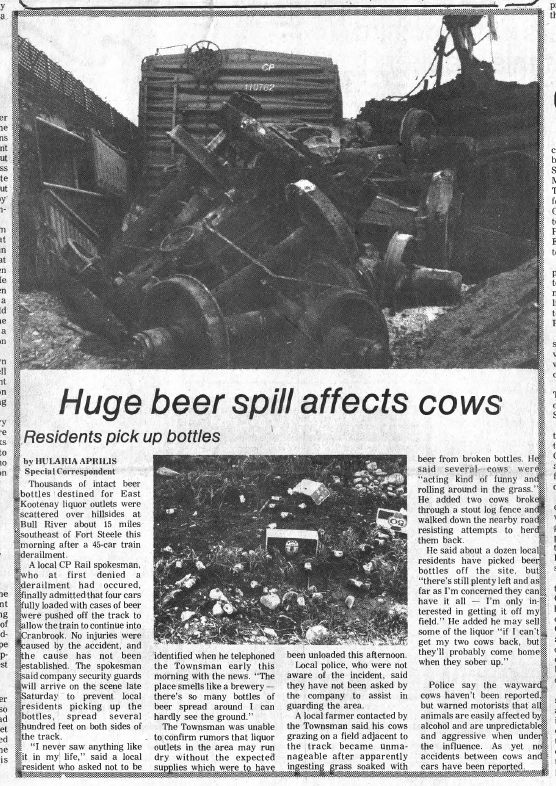
April Fools Day in Cranbrook
by Mel Toth
On March 31, 1978, the Cranbrook Townsman published an article describing a train accident outside of town:

‘Thousands of intact beer bottles destined for East Kootenay liquor outlets were scattered over hillsides at Bull River about 15 miles southeast of Fort Steele this morning after a 45-car train derailment.
A local CP Rail spokesman, who at first denied a derailment had occurred, finally admitted that four cars fully loaded with cases of beer were pushed off the track to allow the train to continue into Cranbrook. No injuries were caused by the accident, and the cause has not been established. The spokesman said company security guards will arrive on the scene late Saturday to prevent local residents picking up the bottles, spread several hundred feet on both sides of the track.
“I never saw anything like it in my life,” said a local resident who asked not to be identified when he telephoned the Townsman early this morning with the news. “The place smells like a brewery – there’s so many bottles of beer spread around I can hardly see the ground.”
The Townsman was unable to confirm rumors that liquor outlets in the area may run dry without the expected supplies which were to have been unloaded this afternoon.
Local police, who were not aware of the incident, said they have not been asked by the company to assist in guarding the area.
A local farmer contacted by the Townsman said his cows grazing on a field adjacent to the track became unmanageable after apparently ingesting grass soaked with beer from broken bottles. He said several cows were “acting kind of funny and rolling around in the grass”. He added two cows broke through a stout log fence and walked down the nearby road resisting attempts to herd them back.
He said about a dozen local residents have picked beer bottles off the site, but “there’s still plenty left and as far as I’m concerned they can have it all – I’m only interested in getting it off my field.” He added he may sell some of the liquor “if I can’t get my two cows back, but they’ll probably come home when they sober up.”
Police say the wayward cows haven’t been reported but warned motorists that all animals are easily affected by alcohol and are unpredictable and aggressive when under the Influence. As yet no accidents between cows and cars have been reported.’
Many people failed to notice the name of the author of the article, “Hularia Aprilis, Special Correspondent”, or the fact that it was published on March 31, the day before April 1. The accident described in the article never actually happened. It was a well-played April Fools prank.
It’s hard to say exactly when April Fools was first celebrated, although there are a number of theories about its origins, none of which have ever been definitively verified. The most popular theory claims that it originated around the 1500s, when the calendar switched from the Julian to the Gregorian calendar. According to this theory, those who didn’t switch over to the new calendar and continued to celebrate the new year in the spring rather than in January were ridiculed. This theory includes the origin of the French version of April Fools, called “poisson d’avril”, or “April fish”. For poisson d’avril, people will stick a paper fish to someone’s back, meaning that they are gullible or easily hooked. Another theory links the origins of April Fools to the Greco-Roman holiday Hilaria, which was a religious festival celebrated at the end of March, marking the beginning of spring.
Whatever the true origin of April Fools, it has been celebrated for hundreds of years in Europe and North America, typically with tricks and pranks. Sometimes these pranks are simple “gotcha” moments. Other times they are more elaborate. A common type of April Fools prank is false information – often very silly – published in a newspaper or other publication. One of the most famous versions of this prank is the Spaghetti Tree Hoax. On April 1, 1957, the BBC aired a program that claimed to show a Swedish family harvesting noodles from spaghetti trees. Spaghetti was, at the time, not eaten much in the UK, and hundreds of British people were fooled by this broadcast, many of them calling into the BBC asking how to grow their own spaghetti tree.
The Cranbrook Townsman has engaged in its own fair share of hoaxes, including an article detailing a plan to create a lake in Cranbrook by draining the waters of Moyie lake and another about urban deer being relocated to an out-of-town mineshaft. However, this article ended with a disclaimer, letting any concerned readers know that it was just a joke.

Hoaxes of this kind have received some criticism in the past. Some people think that outlets who report news shouldn’t be playing pranks on the people who trust them to report facts. The BBC received criticism for the spaghetti tree hoax, and there were those who were not so impressed with the Townsman’s beer spill prank, either. The Townsman did publish a follow-up article clarifying that the report on the accident had been a hoax. In this follow-up article, Canadian Pacific Rail supervisor Wally Zoobkoff said that “Some people took the crash quite seriously and we had a hard time convincing people that it was a joke. (…) They thought we were trying to cover it up.” Although he thought the hoax was funny, he added that not everyone agreed – it disturbed the train operations, and some unemployed people were disappointed when they called in to ask about jobs cleaning the wreckage. They weren’t the only ones to be disappointed, as “dozens of people were reported in the Ft. Steele area Saturday looking for free beer”!
Read more: